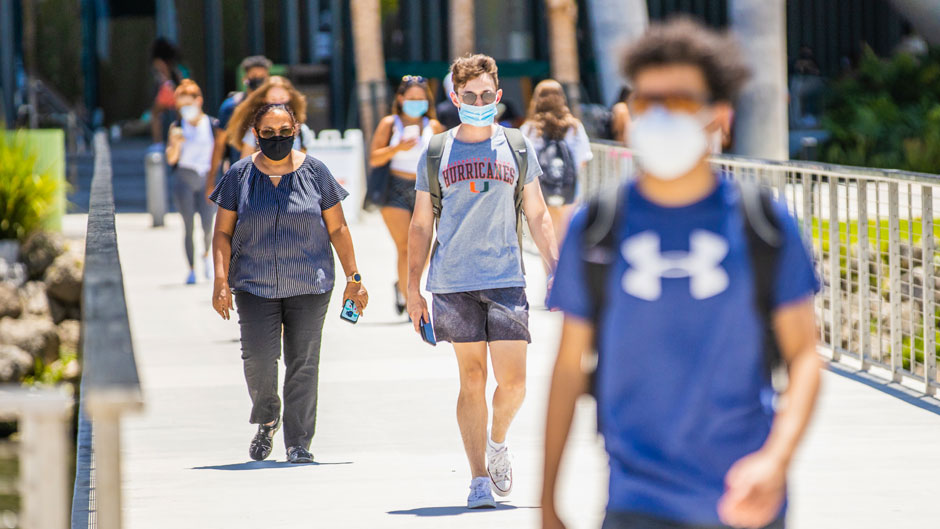Editor's note: Throughout the Fall semester, News@TheU will share short posts about the student Public Health Ambassador Program put in place to assist in efforts to provide resources and educate people on requirements and guidelines due to the coronavirus pandemic. Learn more about the program, which involves 75 students, here.
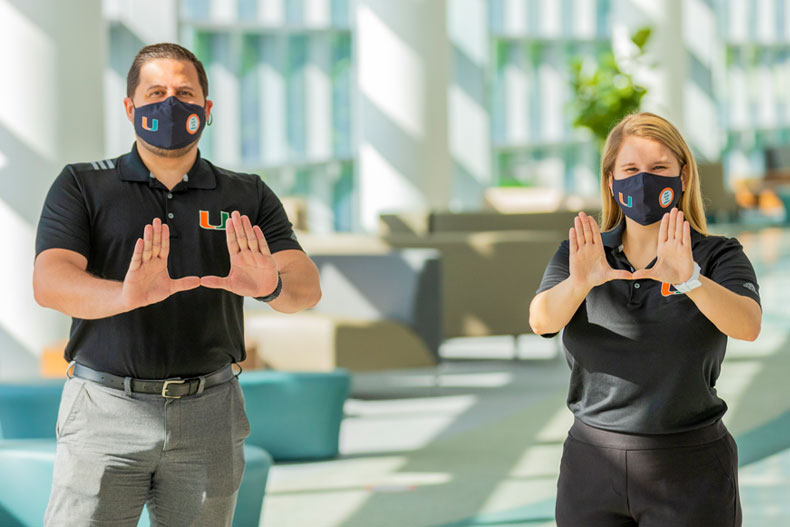
Wednesday, Nov. 18, 2020:
For Andrew Wiemer, director of the Butler Center for Service and Leadership, the public health ambassadors are campus heroes.
“These students are role models for our campus. They have worked tirelessly throughout the semester to make sure everyone is safe,” Weimer said. “They have truly made a positive impact for everyone.”
Wiemer, along with Lindsey Woods, assistant director of the Butler Center for Service and Leadership, were tasked early on in the summer to shape the Public Health Ambassador program—something that had never been done before.
“It is a very historic program. For campuses across the nation, we were a model for them. And our ambassadors helped pave the way to our success. We’re certainly grateful for their efforts on our campus, and I know for a fact, other campuses are grateful for what they’ve done for them as well,” explained Woods.
Wiemer reported that he is very happy about how the program has shaped up. “In the beginning we were all creating a program that we had never done before. And for us to be able to put something together in a very quick time, I think was a phenomenal tribute to where we are today as an institution,” he said.
He explained that the biggest obstacle throughout the semester has been the fear of the unknown. “We hired 75 students and engaged them across campus in order to be as productive as possible, but we didn’t know what was going to happen in our community and how the spread was going to impact our campus,” explained Wiemer. “This is an obstacle we continue to always try to understand and try to keep up with.”
One way they overcame the obstacles that came their way was by being adaptable and innovative throughout the semester. “As soon as we learned something new, whether it was related to the virus or policy on campus, we made sure that the ambassadors were educated on those things, so that they could educate the campus community. And we did that throughout the entire semester. I think that was really indicative of the success of this program,” Woods said.
According to Woods, her favorite part of the Public Health Ambassador program was the opportunities she has had to collaborate with the students.
“I worked very closely with the ambassadors. And from day one, it was evident that these students wanted to be a part of this program. And they wanted to keep the campus safe in order to keep it open,” said Woods. “The ambassadors are some of the most motivated students I have ever interacted with. They are incredibly passionate about this cause, and they understand the work and difference they’re making.”
Wiemer explained that the success of this program was also made possible with the initial vision of Patricia A. Whitely, vice president for student affairs, and with support from other University leaders. “From the very beginning, it was evident that the campus administration was incredibly supportive of this project manifesting,” he recounted.
“I think what has also been really cool is we’ve been able to collaborate with other parts of the university we usually don’t work with, including facilities, operations, and planning; our team in dining services; folks at the Shalala Student Center; and housing and residential life,” said Woods. “They all have shown us that they are fully supportive of the students in this role and recognize it as a need on our campus.”
As this semester comes to an end, both Wiemer and Woods are already working on how to implement the Public Health Ambassador program for the spring.
“We continue to learn more and more each day about the virus. But for us to look forward right now, we will need to have ambassadors. We are still trying to figure out how it will be structured, but we anticipate having a presence on campus,” said Wiemer.
—Amanda M. Perez/News@TheU
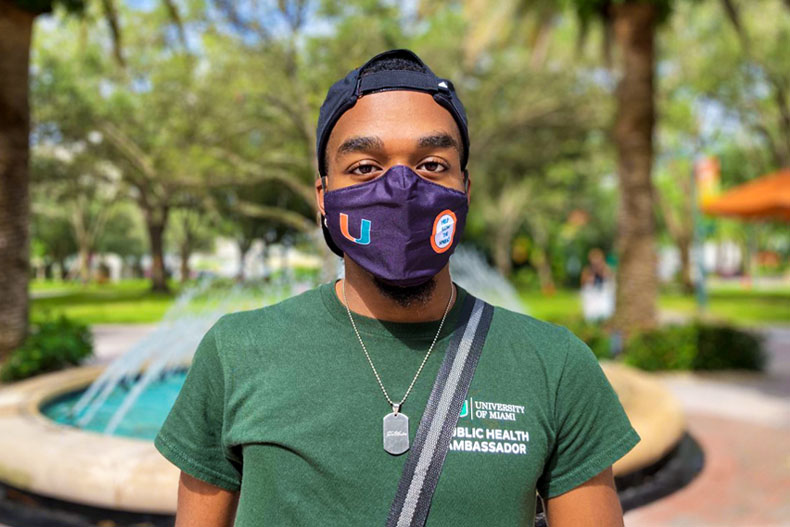
Wednesday, Nov. 11, 2020:
Before joining the Public Health Ambassador program at the University of Miami, Deandre Athias considered himself to be a shy, quiet person who avoided conflict at all costs.
Today, the junior from Snellville, Georgia is months into his role and has found himself stepping more into the spotlight for the sake of safety.
“I was given this platform and I wanted to use it in the best way,” said Athias, a public health major. “I’ve learned how to deal with conflict in a positive way. There’s a right way and a wrong way to approach somebody about their mask.”
One year before the world would come face-to-face with the coronavirus pandemic, Athias had decided to change his major to public health. When he learned about the Public Health Ambassador program, he saw it as the perfect opportunity to gain hands-on experience in the field.
“I wanted to come back to campus and I also wanted to make sure everybody was safe,” said Athias. “I knew that I had to do my part.”
At the University, Athias is responsible for monitoring zone 4—which includes the Dooley Memorial Classroom Building and the School of Nursing and Health Studies. His shift is typically in the evenings.
As the end of the semester approaches and winter break commences, Athias said he is looking forward to rejoining the program next semester.
“I feel like, students are going to be going home, and we’ll be out of school for almost two and a half months,” said Athias. “People may think, ‘I can do whatever I want’ for that time. Public health ambassadors are going to be needed more than ever in January.”
— Ashley A. Williams/News@TheU
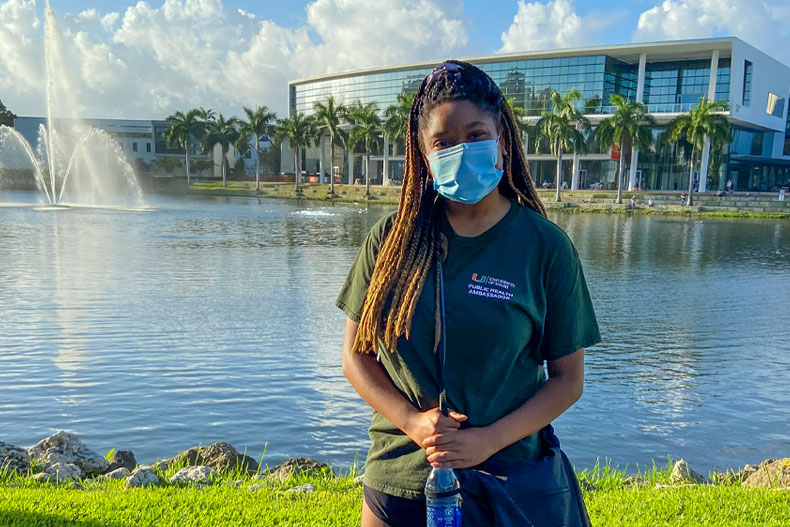
Thursday, Oct. 29, 2020:
As the end of the fall semester quickly approaches, Ashley Phillips, a public health ambassador, has encouraging words for the University of Miami community.
“We are almost at the finish line, and we can do it if we all work together. With only a few weeks until the semester is over, we need to end strong and healthy,” said Phillips.
As a sophomore majoring in nursing, Phillips knew she wanted to apply to the ambassador program in an effort to help strengthen her future career in the medical field.
“I thought it was a great idea to get further involved in the community to help curb this major disease and help maintain healthy behaviors on campus,” explained Phillips. “Throughout this semester I’ve learned how to deal with a lot of different personalities, and I think the skills I’ve grasped will definitely carry on to my future career as a nurse.”
She said her favorite part about being a public health ambassador is being able to play such an imperative role in the success of campus safety.
“I think it’s important for students like us to be present on campus because people honestly forget. This is such a new concept and new way of living, so having that peer-to-peer reminder helps us reach our goal as a safe campus overall,” she explained.
According to Phillips, mostly everyone on campus has been receptive to the protocols.
“It’s great to interact with so many people on campus who are willing to play their part to slow the spread,” said Phillips. “I also have loved having the opportunity to meet new people along the way that I otherwise wouldn’t cross paths with.”
She urged everyone to remember their healthy practices during Halloween and the upcoming holiday season.
“This year Halloween looks very different. I hope people will still continue to stay safe and avoid large gatherings. These few weeks leading up to the holidays are the most important because we want to avoid spreading the virus to those back at home who may be at risk,” Phillips said.
She explained that it is important to keep wearing your mask and to continually wash your hands.
“People need to make sure they’re doing their part on and off campus,” she said. “It’s important to constantly have these reminders in the back of our minds because at the end of the day ’Canes care for ’Canes, and it’s up to us to take care of each other for the well-being and positive future of our campus.
—Amanda M. Perez/News@TheU
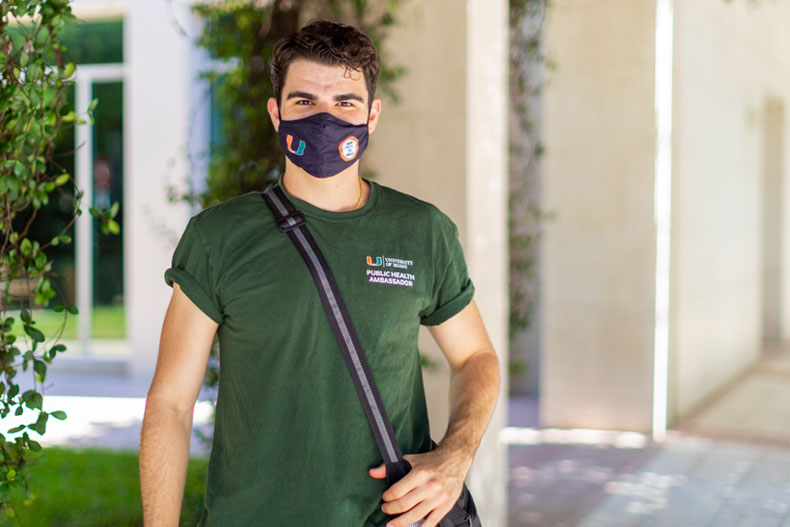
Monday, Oct. 12, 2020:
Combating the coronavirus is a marathon not a sprint—that is the message Ryan Garay, a public health ambassador, wants the University of Miami community to remember. As we approach the mid-point of the semester, Garay said that he hopes to keep encouraging everyone on campus to do their part in slowing the spread of COVID-19.
“As we progress through the tail end of the semester, let’s keep doing what we’re doing to keep our numbers low. We as a community have created strong habits of wearing masks and have learned how to acclimate to this new normal. So let’s keep going strong, especially as we approach the holiday season,” he said.
In an effort to keep the numbers low, Garay urges his fellow peers to remember to “actively practice safe behavior both on and off campus because it is the perfect example of what ’Canes Care for ’Canes is all about!”
Garay, a junior majoring in exercise physiology, said his overall experience working as an ambassador has been very positive. “I think the community at first wasn’t exactly sure what our role was. But as we’ve gone through the weeks, I think we shaped well as a program that has helped encourage and motivate everyone on campus to practice safe behaviors,” he added.
He explained that being part of the program has also been a learning experience for him. “It’s definitely helped my interactive skills, and I’ve learned how to approach people with a positive attitude. I think the program as a whole has been working on making sure our roles promote constructive encouragement,” Garay said.
He has enjoyed meeting and collaborating with other public health ambassadors as well. “I think the Butler Center has brought together a nice group that represents a wide range of students who are looking to help the community. There is a genuine belief among us that we want to help the UM community stay safe,” said Garay. “It’s been a very rewarding experience to see the appreciation from our fellow peers who we interact with on a daily basis.”
- Amanda M. Perez/News@TheU
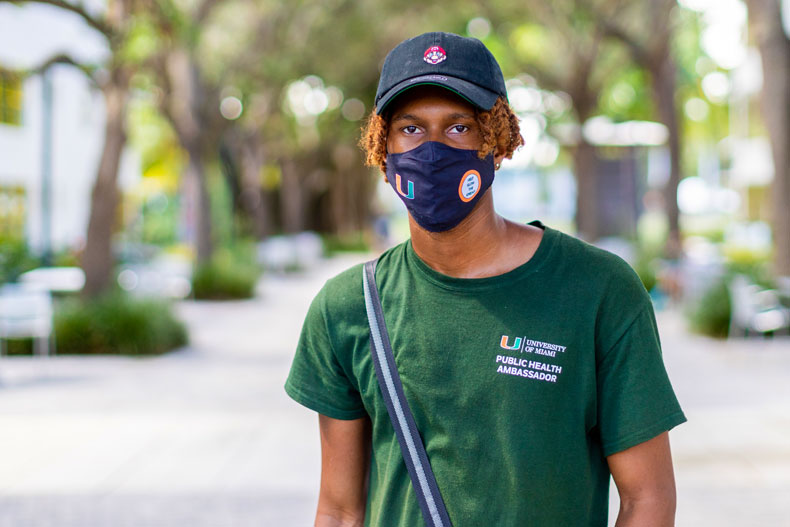
Tuesday, Oct. 6, 2020:
Following a rousing first year at the University of Miami that was interrupted by the coronavirus pandemic, Joshua Wooten was willing to do whatever it took to make the return to campus possible.
Today, the sophomore from Upper Marlboro, Maryland, is a grateful team lead for the University’s Public Health Ambassador Program.
“I knew that this position would give me a lot of responsibility in terms of holding myself accountable and being in charge of others,” said Wooten, a marketing major in the Miami Herbert Business School. “I felt like it was important for individuals to step up and take on that role to make sure that we’re all doing our part.”
In his role as team lead, Wooten is responsible for managing all five zones on the Coral Gables Campus during his shift. Using Microsoft Teams to communicate, Wooten serves as a bridge between his team and the administration.
“I make rounds and make sure that everything is going smoothly with all the other public health ambassadors. I’m there if they need any additional supplies or run into something that makes them feel uncomfortable,” said Wooten, who hopes to work in the front office of a professional basketball team one day.
So far, Wooten said, his interactions with the campus community have been mostly positive. Students, faculty, and staff have welcomed the ambassadors with open arms as many understand the need to remain healthy.
“One thing I wanted our program to do is be an example for the rest of the world by showing that we can maintain a safe environment,” said Wooten. “I am confident that we are effective in that as other universities are adopting the program model now.”
— Ashley A. Williams/News@TheU
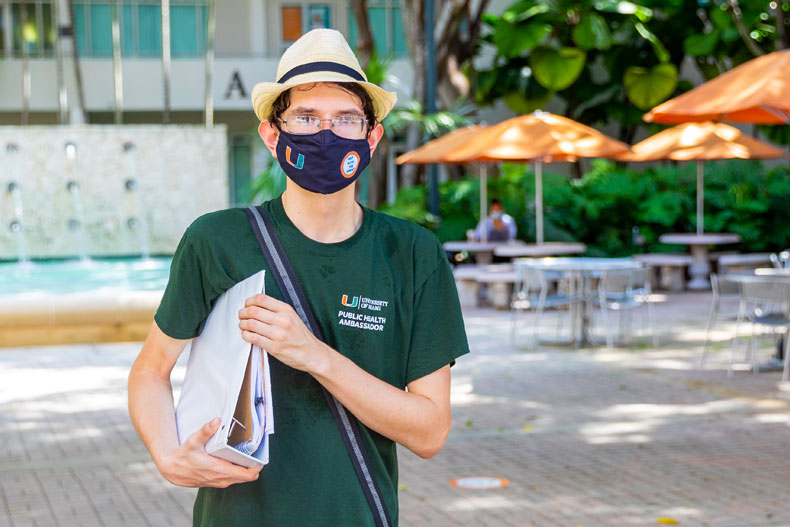
Monday, Sept. 28, 2020:
Working as a public health ambassador has become more than just a job for Luke Pyron, a senior at the University of Miami double majoring in biochemistry and religious studies.
“I'm glad I have the opportunity to do my position and although it is tiring work, I find it a worthwhile experience at the end of the day. And I feel like the university is doing everything with a high degree of positivity,” said Pyron.
Established this fall by the Butler Center for Service and Leadership, the Public Health Ambassador Program, which aims to promote a culture of healthy living and accountability, has not only become respected and accepted among University students, faculty, and staff, but it has also become widely popular among other higher learning institutions. Other colleges and universities across the nation have implemented similar programs.
“I think it's a great thing that they’re creating similar programs, because I feel like the model here is working,” said Pyron. “I feel that if more universities adopt the model and put their own changes to it, we can see what makes it better, what makes it worse, and try and find one common solution.”
Two to three days a week, Pyron is tasked with monitoring zone 5 of the Coral Gables Campus, which includes the School of Law, Cox Science Building, and the College of Arts and Sciences. He said since starting his job, he has had mostly positive interactions. “One thing I like about the position is that I've gotten to know the areas of campus I patrol better than the back of my own hand,” said Pyron.
“Regardless as to how long this pandemic is going to last, we need to treat it as a learning experience for everyone,” he said.
To Pyron, becoming an ambassador felt like the right thing to do and is yet another way for him to do his part as a ’Cane, to keep others in his community safe. For the past month and a half, Pyron said he is also more appreciative of his institutional leaders and administrators for their sensible responses and thoughtful procedures throughout this critical time.
— Ashley A. Williams/News@TheU
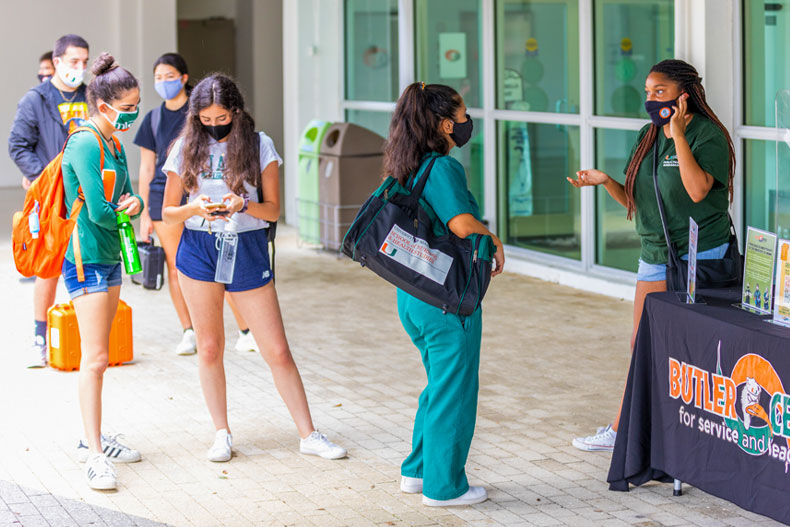
Monday, Sept. 21, 2020:
Allie Frago is in her first year at the University of Miami and she couldn’t be prouder about being on campus, learning, and interacting with her peers. While taking a break in between classes Monday, she stopped by the Public Health Ambassador Program’s meet and greet event to check in and thank them for their service.
“I see ambassadors all the time, pretty much everywhere on campus,” said Frago, an accounting major from Miami. “Having them on campus is really awesome because it’s nice having someone around reminding those who need it to follow the guidelines.”
Lindsey Woods, assistant director of the Butler Center for Service and Leadership, said the center’s ’Canes for a Change week is always one of the most inspiring times of the fall semester. It allows students across the campus to engage with campus partners and learn more about student organizations that engage in service and leadership at and beyond the University.
“This group has been a pleasure to work with,” said Woods. “Honestly, they’re one of the most respectful and enthusiastic groups I have ever worked with. Each of them is always so ready to assist.”
University leaders stopped by the event to praise the public health ambassadors for their tremendous efforts thus far.
“I am proud of our student ambassadors for really taking control, being in the forefront, and helping other students,” said Ryan C. Holmes, associate vice president of student affairs and dean of students. “This program has been one that has been emulated by other universities. We are leaders, and it shows.”
“It’s critical to keeping the University safe and open,” said Steven K. Priepke, senior associate dean of students. “We really are so grateful, and they are such a great group of young people who are really motivated to do the right thing.”
Shifting gears from their usual workload, ambassadors Kyle Romero, Ashley Phillips, and Andrew Smith offered passersby a fanny pack, cup, or water bottle while also informing them about the work they do on campus to enhance the COVID-19 prevention efforts.
“We are so happy to be out here—even in the rain today,” said Romero, a sophomore majoring in biochemistry. “It’s been exciting to get to know some many people while keeping the campus safe.”
— Ashley A. Williams/News@TheU
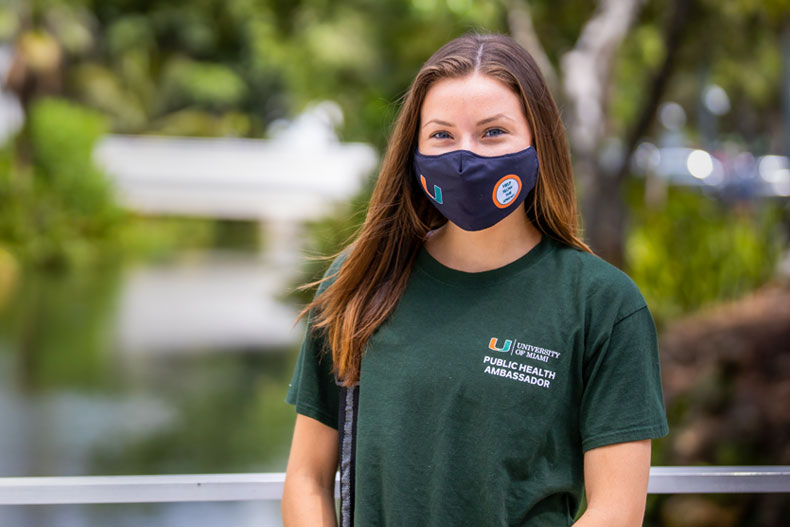
Wednesday, Sept. 16, 2020:
The weekly Well ’Canes Market on the University of Miami Coral Gables Campus is back. While much of the community is thrilled with the news, public health ambassador Anna Davis wants to remind everyone to adhere to the protocols that have been put in place.
“It’s important to wear your mask and try to go at a time when there’s likely to be less people, so that you can avoid large crowds. Keep your distance and maybe wait in the Foote Green until there’s space available to still maintain 6 feet of distance,” Davis pointed out.
Davis is one of the 75 public health ambassadors who work to ensure that higher-traffic areas on campus continue to stay healthy and safe.
“Anytime there is an event on campus that pops up, the Butler Center for Service and Leadership, which manages the ambassador program, makes open shifts available to have added coverage to that area,” she explained.
Davis, a senior double majoring in psychology and public health, said she applied to the program because she wanted to be involved on campus this semester in a unique way.
“I knew that the campus was going to look very different, and I felt like it was a really great way to stay involved and have that peer connection with other people at school,” she said. “I also just wanted to do my part in helping the slow of the spread and helping the campus stay open.”
As a team leader, Davis always makes sure her role as an ambassador is one of an educator and not an enforcer.
“In my experience, I find that if you’re friendly with people on campus and approach them in a more empathetic way and not as someone who is looking to get them in trouble, they’re definitely more responsive,” said Davis.
“Remember that it’s important to think about the safety and health of others. We need to keep reminding ourselves to be responsible so that we can continue to be on campus this semester,” is the message Davis wants to relay to the University community.
“I think it’s really important for people to understand why we have to follow protocols,” she added. “I feel like if you understand them, then you are more inclined to follow rules. And if we follow these rules, then that’s how were going to keep the campus open.”
- Amanda M. Perez/News@TheU
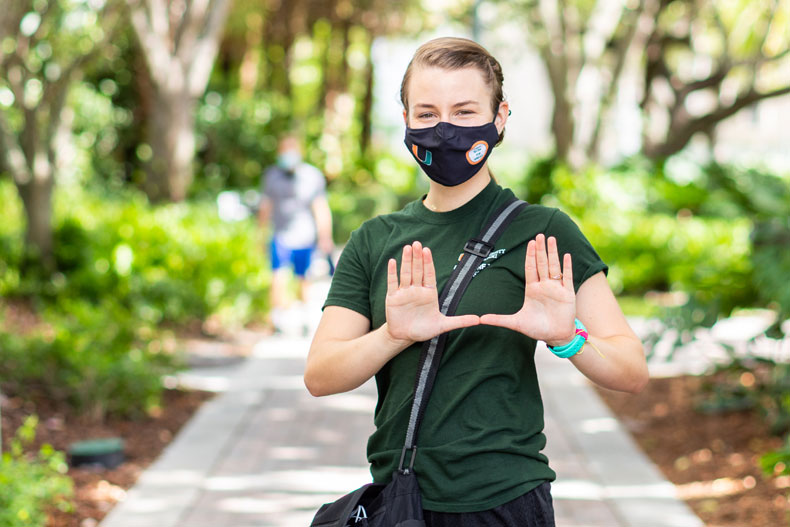
Friday, Sept. 4, 2020:
Camila Treptow felt like it was her duty to apply to the student Public Health Ambassador Program after the COVID-19 pandemic hit home in early July.
“My whole family tested positive for the virus. Thankfully, my family and I only had mild symptoms, but I feel horrible for the people who unfortunately had worse symptoms,” she said. “I knew after my experience, I wanted to do everything possible to stop the spread because I personally know how bad it makes you feel and how easily it spreads.”
As a recent transfer student, Treptow knew she wanted to take extra responsibility during her first semester as a ’Cane to help share the importance of working together to help slow the spread of the virus.
“We have to help each other and protect each other. It’s all about teamwork to make this situation better. Wearing a mask not only protects yourself, it protects everyone around you,” said Treptow.
She believes students like her are the best people to spread that message.
“People tend to mostly listen to people who are around their own age and in the same kind of situation. For example, when your parents tell you something, you tend to not listen as much as if your friend told you the same thing and you can relate,” she explained.
She said her first month of the job has been positive.
“It’s been pretty awesome. I’m very happy with how the students and faculty have reacted to the program. Almost everyone on campus is taking it very seriously,” Treptow said. “It’s just a couple people here and there who have to be reminded by the rules, but I’m really pleased with how UM is taking everything very seriously,”
Treptow, who is a biology major, hopes to go to medical school in the future and become a pediatrician. She thinks her job as an ambassador will help in her future career.
“Doctors in my family have told me that you learn most from interacting with people,” she said. “In this role, I will be able to witness human behavior, which I believe is really important if I want to study medicine.”
— Amanda M. Perez/News@TheU
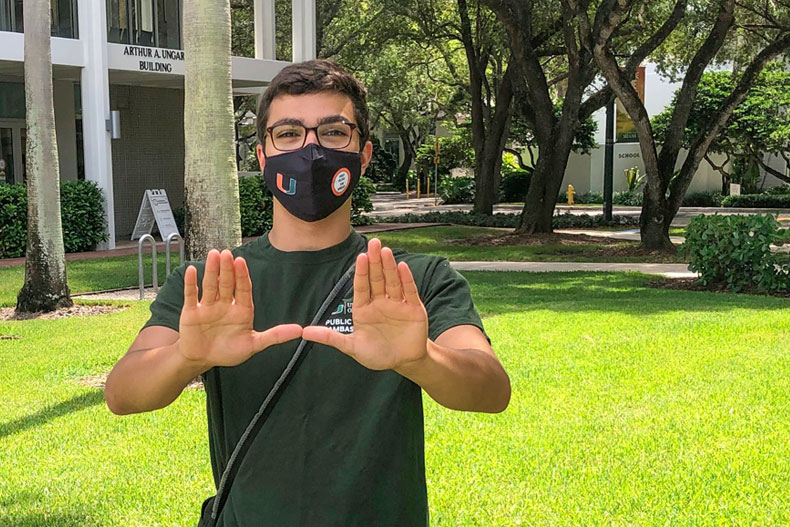
Monday, Aug. 31, 2020:
The new Public Health Ambassador Program has positively affected several aspects of campus life since classes resumed on Aug. 17. For one senior, it has motivated him to tweak his post-graduate plans.
Just four weeks into the job and Michael Antonietti, a senior majoring in biochemistry and nutrition, has changed his plans of applying to a M.D. program and instead will apply to a M.D./M.P.H. dual degree program. The Chicago native said his new role, coupled with how marginalized groups are disproportionally affected by COVID-19, has helped him understand another side to medicine that’s often overlooked.
“It’s important to understand social determinants,” he said. “Doctors are so much more than medicine. I want my future patients to be able to talk to me about anything.”
Since his first year at the University of Miami, service has been a large part of Antonietti’s life. He was previously involved with the Butler Center for Service and Leadership and learned about the Public Health Ambassador Program from the Butler Center’s assistant director, Lindsey Woods.
“I felt it was my responsibility to my classmates. I want to be the one to set the example and lead the way,” he said.
A self-proclaimed “people person,” Antonietti enjoys his ambassador role and is pleasantly surprised of most student’s positive response to his presence. He’s stationed in zone five of the University—an area of campus that covers the Richter Library and Foote University Green; Ashe Administration Building; School of Law; Ungar, Cox Science, and Knight Physics Buildings; and the College of Engineering—and said he spends more time refilling hand sanitizer stations than having to tell people to wear their masks.
“It’s more about working with the Dean of Students and the facilities team providing wipes, ensuring proper signage is up, and making sure hand sanitizers aren’t running out than anything,” he said. “I think everyone understands that we have to make sacrifices if we want to be on campus.”
— Ashley A. Williams/News@TheU
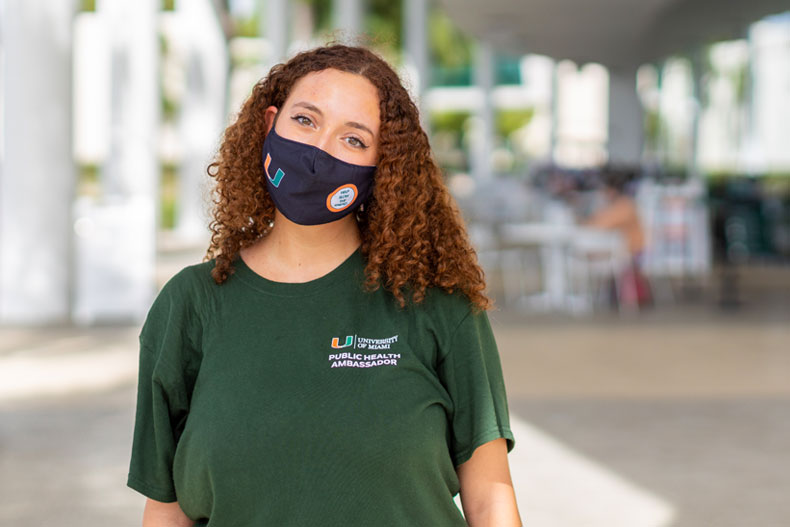
Thursday, Aug. 27, 2020:
When Evelyn Menkes received the email about the University of Miami’s Public Health Ambassador Program, she felt compelled to apply.
Service has always been a large part of Menkes’ undergraduate career thanks to the University’s Butler Center for Service and Leadership. Through diverse developmental responsibilities and leadership roles, she said, the Butler Center has expanded her leadership knowledge and skills exponentially.
“Since it’s my last semester, I wanted to be able to give back in some way,” said Menkes, who aspires to be a physician one day. “They showed me the beauty of volunteering and social justice.”
According to Menkes, the public health ambassador program has provided an opportunity to give back to a community that has given so much to her since becoming a ’Cane.
“I’m from New York, so COVID-19 really hit my area heavily and I felt so helpless in the beginning. I felt like there was nothing that I could do back then,” she said. “Now that I’m back in Miami, I feel like it’s my responsibility to prevent it from spreading.”
Now weeks into her new position, she said the response by students, faculty, and staff, has been positive.
“One of the biggest things I’ve had to deal with are the people who don’t know who we are and are just interested in finding out what our job is,” she said. “It’s my responsibility to have a conversation and educate those people.”
In addition to her new role as an ambassador, this semester Menkes is also the president of Alternative Breaks and co-chair of the ’Canes Emergency Response Team.
— Ashley A. Williams/News@TheU
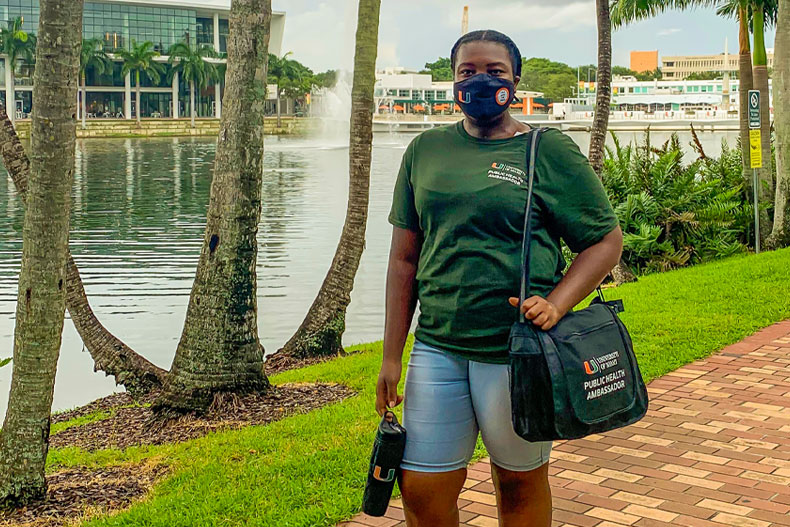
Friday, Aug. 21, 2020:
As Fedelene Camille navigates her second week of a markedly different fall semester at the University of Miami, she can sense a new community forming among her peers on the Coral Gables Campus.
“I love that we’re meeting people; I love that we’re networking. But I also serve as a reminder that you have to social distance,” said Camille, one of 75 public health ambassadors hired by the University. “For the most part, students have been really responsive, positive, and respectful.”
Camille, a senior studying biochemistry and molecular biology, aspires to be a medical doctor one day. Coincidently, she was looking for a job this semester and once she received an email about the program, she jumped at the opportunity to apply.
“I find this job very rewarding and to know that I have an impact on the health of others,” said Camille. “As a senior, I think it’s really great I can contribute and be part of a team that is helping to keep campus open and safer by encouraging and informing peers about healthy behaviors.”
Camille has worked two shifts so far in the area around the Patti and Allan Herbert Wellness Center, a popular meeting spot for students. She said the presence of ambassadors on campus has become valued.
“We are becoming recognized now by our shirts. So, when they see me approach, I don’t even have to tell someone to do something—they automatically see me, and they’ll fix their mask or something,” said Camille.
Overall, she is proud and excited to be fulfilling such an important role on campus. One day, she said, she looks forward to applying the knowledge she is learning today towards her future career.
For now, she will continue to try and keep the campus safe for everyone.
“I think it’s important for everyone to play their role,” she said. “If you see something, say something.”
— Ashley A. Williams/News@TheU
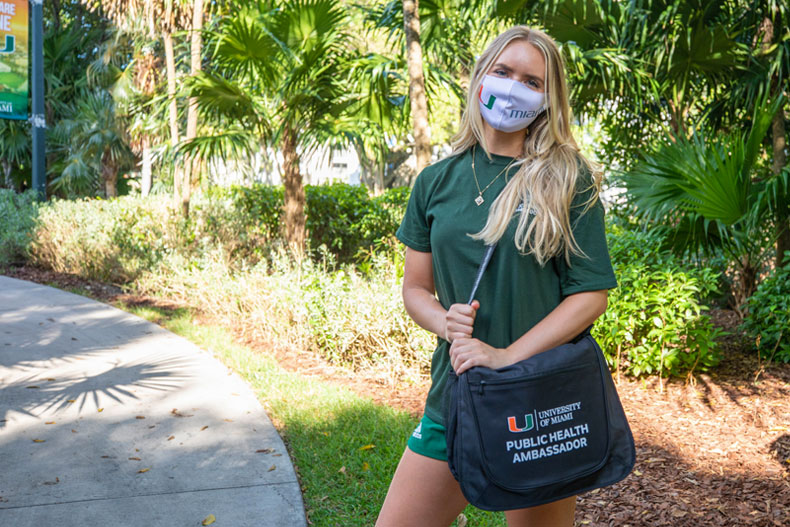
Wednesday, Aug. 19, 2020:
It’s cool to care. That’s the message Alexandra Fioto, who is a public health ambassador, wants her fellow peers to know. As she roamed about campus during her first week on the job, she made sure to remind the community about the important guidelines the University of Miami has put into place to help slow the spread of COVID-19.
“I aim to lead by example, and I think peer-to-peer influence is so important. If I show that I’m following the guidelines, I think others will want to follow them too,” explained Fioto.
The senior said she decided to sign up for the program because she wants to make a difference.
“I just really wanted to get involved and do my part to make sure that I’m making campus and school a safe place for everyone. At the end of the day, this program is not designed to get people in trouble; instead, it’s supposed to positively influence the campus community,” she explained.
Her goal as an ambassador is to remind everyone that it is important for ’Canes to care for ’Canes.
“Everyone should be adaptable during these unprecedented times. Ultimately, everyone wants to have that campus experience, so we all have to do our part now in order to work toward that. I think having a positive attitude toward the policies and changes is only going to help us get to that point,” Fioto said.
Fortunately, she has seen that people are doing their part.
“I’ve had to remind people about the proper way of wearing their masks, but everyone is very polite. And as soon as I ask them to fix it, they comply,” she explained.
As one of the captains of the University cheerleading squad, Fioto hopes the campus can eventually get to a point where she can reunite with her teammates and practice what she loves to do.
“Right now, we are not allowed to gather for practice, so I’m looking forward to any opportunity for a return. Cheer has been my passion and it’s brought me so much happiness, so being able cheer again would make me really happy,” she said.
Until then, she noted that she will continue to work hard as an ambassador and as a marketing student—one who aspires to enter the cosmetic industry when she graduates.
“I’m very interested in beauty and skin care; so, hopefully I’ll be able to get a marketing job in that field,” Fioto said. “I also really enjoyed my business classes, so I’ve also been considering the opportunity of going to law school. There’s lots of exciting stuff ahead.”
— Amanda M. Perez/News@TheU
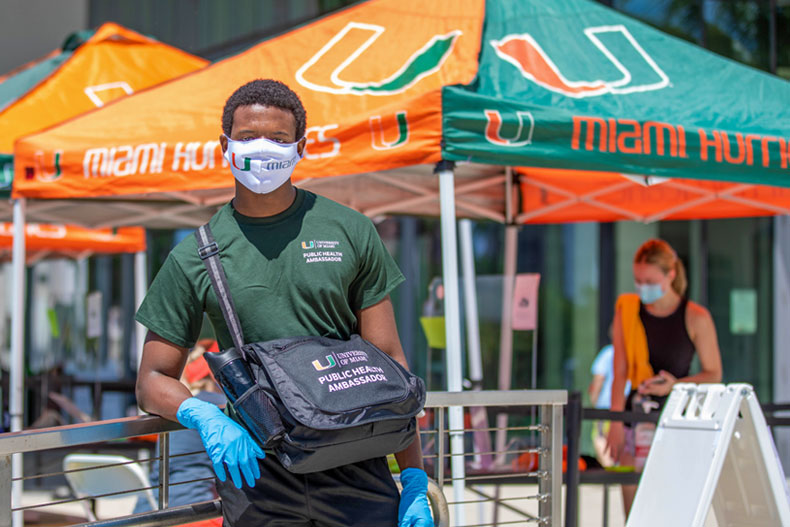
Thursday, Aug. 13, 2020:
For Jacques Calixte, a first-year student at the University of Miami, being involved in several roles simultaneously is nothing new.
“I’m used to a lot of responsibility. I was the type of person in high school who took on every single club and sport. So applying for the role as a public health ambassador felt natural,” Calixte pointed out.
When Calixte heard about the creation of the public health ambassadors, who would support the safe reopening of the Coral Gables Campus, he thought it would be a perfect learning opportunity. He was one of 75 students selected for this important role.
As part of the 2020 class of high school graduates, Calixte explained, “I personally know what it feels like to be affected by COVID-19. And as an aspiring physician, I thought it would be interesting to apply the love that I have for the health field. I really wanted to do something that would be able to help the community, so applying to this job felt like the best option.”
As an ambassador, he hopes to continually keep educating people throughout the semester. “I just hope that people come up to me and ask me for information, and I hope to keep informing people and help influence them in following important guidelines,” said Calixte.
He also admitted that he would use his role as an ambassador to meet new people and become familiar with campus.
“I’m getting the opportunity to learn a lot about different parts of campus before other incoming freshmen. I’ve gotten lost a couple of times, but this role has made the process of coming to UM easier,” he said. “I actually have run into a couple of familiar faces while walking around, and I’ve made friends with people who have asked me for help.”
Calixte was happy to report that his first week on the job was successful. “I only had to give out one mask throughout the whole week. The main problem I’ve come across is that people aren’t wearing their mask correctly. So, I’ve just had to remind them. But people have been very compliant about following the policies,” he said.
Overall, Calixte is looking forward to starting his journey as a ’Cane. “I’m so excited to finally join the UM community,” he exclaimed. “I’ve heard a lot of great things, and everyone is really supportive. I know this year is going to look different, but I do hope I get to experience what it’s like to truly be a ’Cane!”
— Amanda M. Perez/News@TheU
